2024届高考英语语法复习:名词性从句课件(共23张PPT)
文档属性
| 名称 | 2024届高考英语语法复习:名词性从句课件(共23张PPT) |  | |
| 格式 | pptx | ||
| 文件大小 | 3.4MB | ||
| 资源类型 | 教案 | ||
| 版本资源 | 通用版 | ||
| 科目 | 英语 | ||
| 更新时间 | 2023-08-21 12:33:05 | ||
图片预览


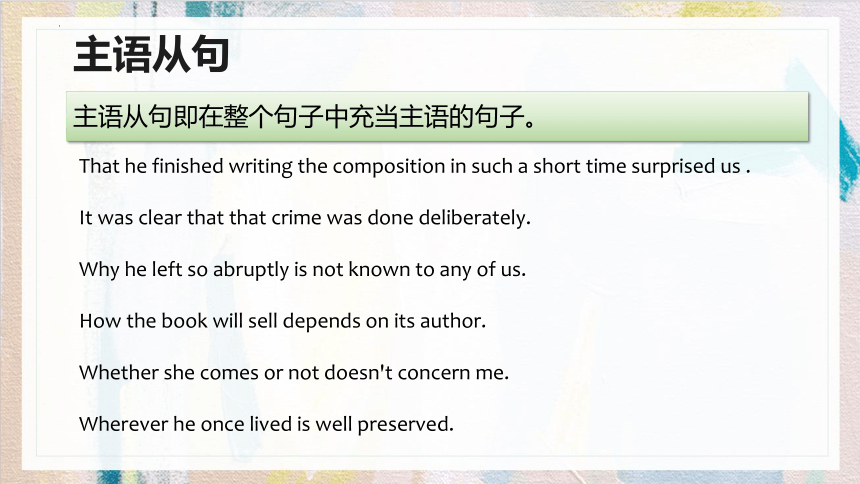
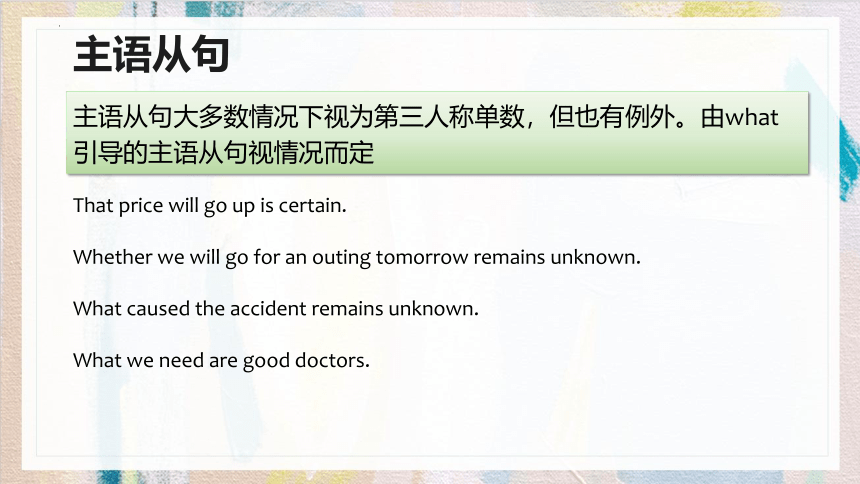
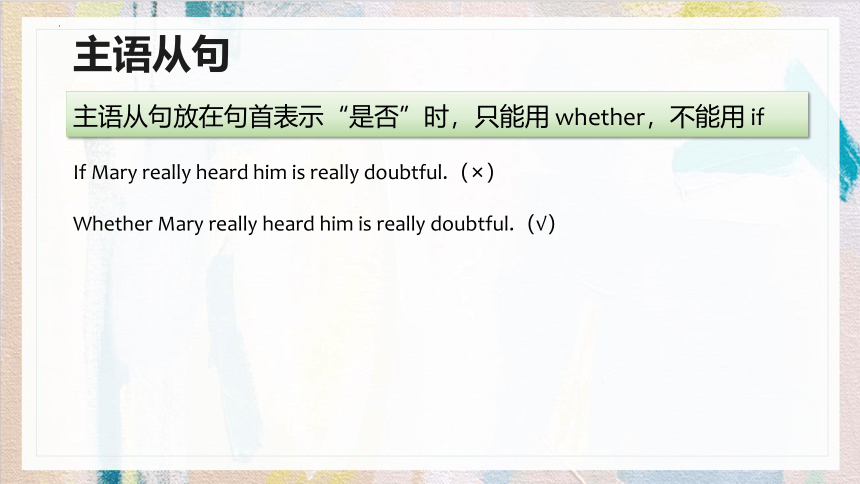
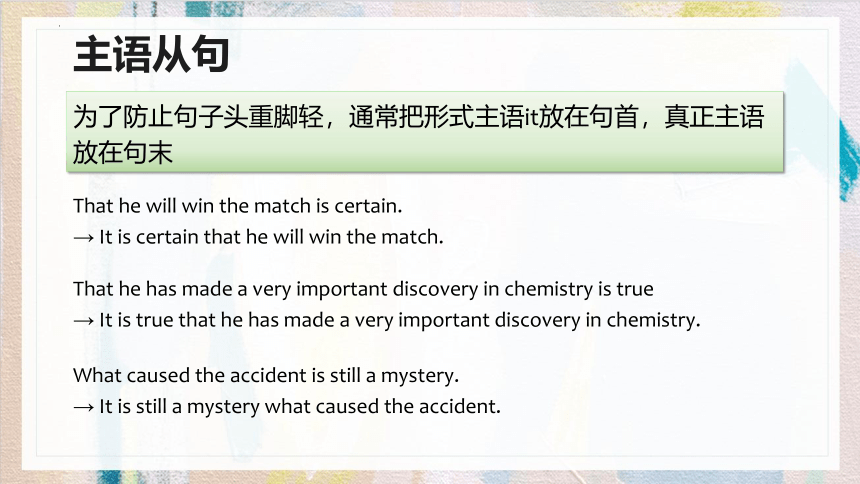

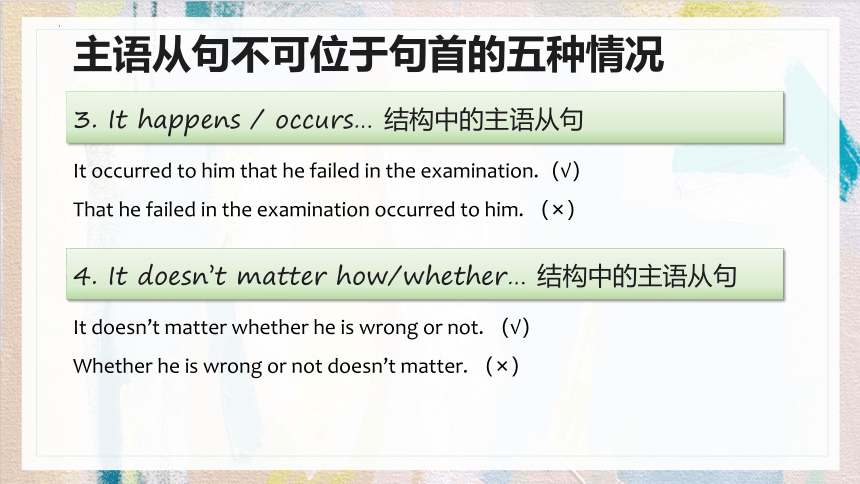
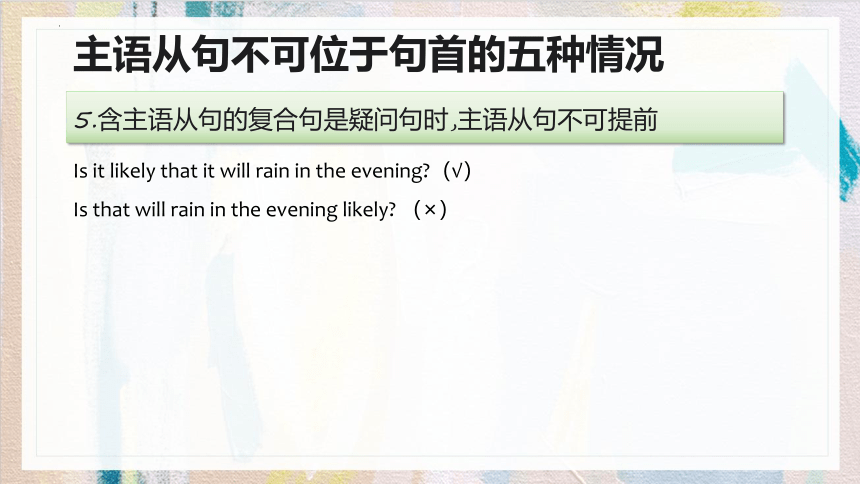
文档简介
(共23张PPT)
名词性从句
名词性从句
名词性从句是在句子中起名词作用的句子,功能相当于名词词组,它在复合句中可作主语、宾语、表语和同位语,因此名词性从句又可分为:
主语从句
宾语从句
表语从句
同位语从句
主语从句
主语从句即在整个句子中充当主语的句子。
That he finished writing the composition in such a short time surprised us .
It was clear that that crime was done deliberately.
Why he left so abruptly is not known to any of us.
How the book will sell depends on its author.
Whether she comes or not doesn't concern me.
Wherever he once lived is well preserved.
主语从句
主语从句大多数情况下视为第三人称单数,但也有例外。由what引导的主语从句视情况而定
That price will go up is certain.
Whether we will go for an outing tomorrow remains unknown.
What caused the accident remains unknown.
What we need are good doctors.
主语从句
主语从句放在句首表示“是否”时,只能用 whether,不能用 if
If Mary really heard him is really doubtful.(×)
Whether Mary really heard him is really doubtful.(√)
主语从句
为了防止句子头重脚轻,通常把形式主语it放在句首,真正主语放在句末
That he will win the match is certain.
→ It is certain that he will win the match.
That he has made a very important discovery in chemistry is true
→ It is true that he has made a very important discovery in chemistry.
What caused the accident is still a mystery.
→ It is still a mystery what caused the accident.
主语从句不可位于句首的五种情况
1. If引导的主语从句
It is uncertain if he will leave for Beijing tomorrow. (√)
If he will leave for Beijing tomorrow is uncertain. (×)
2. It is said / reported/ believed (that)…结构中的主语从句
It is said that President will visit our school next week. (√)
That President will visit our school next week is said. (×)
主语从句不可位于句首的五种情况
3. It happens / occurs… 结构中的主语从句
It occurred to him that he failed in the examination.(√)
That he failed in the examination occurred to him. (×)
4. It doesn’t matter how/whether… 结构中的主语从句
It doesn’t matter whether he is wrong or not. (√)
Whether he is wrong or not doesn’t matter. (×)
主语从句不可位于句首的五种情况
5.含主语从句的复合句是疑问句时,主语从句不可提前
Is it likely that it will rain in the evening (√)
Is that will rain in the evening likely (×)
宾语从句
I think (that) you should tell the truth.
I can't imagine what made him act like that.
Can you tell us who is responsible for the fire
Please explain why this is impossible.
Nobody can tell when she will arrive.
Eat whichever one you like and leave the others for whoever comes in late.
She asked me where I was going to.
I wondered how he could make such rapid progress in his study of French.
Do you know if/ whether any decision has been arrived at
宾语从句中that不可省略的情况
有两个或两个以上的宾语从句,第二个that不能省略
I believe (that) you have done your best and that things will get better.
当宾语从句是双宾语中的直接宾语时
He told me that he was leaving for Japan.
宾语从句中that不可省略的情况
宾语从句前有插入语
We hope, on the contrary, that he will stay at home with us.
在“it(形式宾语)+补语”之后
I think it necessary that he should stay here.
宾语从句中只能用whether的情况
whether or not
I don’t know whether he will come or not.
介词 + whether
I don’t care of whether he is handsome.
whether to do
He wondered whether to stay here the next week.
表语从句
结构:主语+系动词+表语从句
The fact is that he didn't notice the car until too late.
The mystery is whether he ever went there at all.
The question is why he likes the place so much.
The problem is not who will go but who will stay.
表语从句
结构:主语+系动词+表语从句
The fact is that he didn't notice the car until too late.
The mystery is whether he ever went there at all.
The question is why he likes the place so much.
The problem is not who will go but who will stay.
表语从句不能用If,只能用whether 引导
同位语从句
同位语,按字面意思理解,就是与同位语前面的名词具有相同地位的成分,即同位语通常紧跟在名词、代词后面,作进一步的说明和解释。同位语从句,就是用一个句子来做同位语成分
We both can do it. (both是we的同位语)
They had to face the fact that the nearest filling station is 30 miles away.
My original question, why he did it at all, has not been answered.
Do you have any idea how soon they are coming
同位语从句
同位语从句,就是用一个句子来做同位语成分,通常跟在一些抽象名词之后,常见的有:hope / wish / fact / answer / problem / news / belief / idea / promise / suggestion / order / conclusion / information / thought
They expressed their wish that she _____________(accept) the award.
They were faced with the demand that this tax ______________(abolish).
The suggestion that the new rule _____________(adopt) came from him.
若先行词是表示命令、建议、愿景的名词(如:demand, suggestion, wish, resolution, order),同位语从句要用虚拟语气
accept
be abolished
be adopted
同位语从句
不管是同位语还是同位语从句,都起到解释说明的作用,不是关键的句子成分,所以即使去除同位语或同位语从句,也不会影响句子的完整性。
同位语从句在句中的特殊位置
有时同位语从句可以不紧跟在说明的名词后面,而被别的词隔开。
Several years later, word came that Napoleon himself was coming to inspect them.
The rumor spread that a new school would be built.
The order soon came that all citizens should evacuate the village.
The thought came to him that maybe the enemy had fled the city.
同位语从句与定语从句的区别
同位语从句
The possibility that the majority of the labor force will work at home is often discussed.
We are not looking into the question whether he is worth trusting.
定语从句
We are not looking into the question whether he is worth trusting.
同位语从句的先行词通常是抽象意义的名词,如promise, belief, fact等,而定语从句的先行词可以是名词、代词或句子。
同位语从句与定语从句的区别
定语从句是对其先行词的修饰;同位语从句是对其前面的名词进行解释说明
The news that our team has won the game was true.
我们队赢了比赛的消息是真的。
The news that he told me yesterday was true.
昨天他告诉我的那个消息是真的。
这个消息是:我们队赢得了比赛,从句对news的内容进行解释,是同位语从句
这个消息是他告诉我的,从句对news的来源进行了限制,是他告诉我的,而不是别人告诉我的,因此是定语从句
同位语从句与定语从句的区别
引导词that在同位语从句中只起连接作用;在定语从句中充当句子成分。换句话说,同位语从句是一个完整的句子,而宾语从句是一个欠缺成分的句子。
The news that our team has won the game was true.
我们队赢了比赛的消息是真的。
The news that he told me yesterday was true.
昨天他告诉我的那个消息是真的。
从句是our team has won the game,成分完整,that不充当成分,是同位语从句
从句是that he told me yesterday,that 充当told的直接宾语,属于定语从句
The End
名词性从句
名词性从句
名词性从句是在句子中起名词作用的句子,功能相当于名词词组,它在复合句中可作主语、宾语、表语和同位语,因此名词性从句又可分为:
主语从句
宾语从句
表语从句
同位语从句
主语从句
主语从句即在整个句子中充当主语的句子。
That he finished writing the composition in such a short time surprised us .
It was clear that that crime was done deliberately.
Why he left so abruptly is not known to any of us.
How the book will sell depends on its author.
Whether she comes or not doesn't concern me.
Wherever he once lived is well preserved.
主语从句
主语从句大多数情况下视为第三人称单数,但也有例外。由what引导的主语从句视情况而定
That price will go up is certain.
Whether we will go for an outing tomorrow remains unknown.
What caused the accident remains unknown.
What we need are good doctors.
主语从句
主语从句放在句首表示“是否”时,只能用 whether,不能用 if
If Mary really heard him is really doubtful.(×)
Whether Mary really heard him is really doubtful.(√)
主语从句
为了防止句子头重脚轻,通常把形式主语it放在句首,真正主语放在句末
That he will win the match is certain.
→ It is certain that he will win the match.
That he has made a very important discovery in chemistry is true
→ It is true that he has made a very important discovery in chemistry.
What caused the accident is still a mystery.
→ It is still a mystery what caused the accident.
主语从句不可位于句首的五种情况
1. If引导的主语从句
It is uncertain if he will leave for Beijing tomorrow. (√)
If he will leave for Beijing tomorrow is uncertain. (×)
2. It is said / reported/ believed (that)…结构中的主语从句
It is said that President will visit our school next week. (√)
That President will visit our school next week is said. (×)
主语从句不可位于句首的五种情况
3. It happens / occurs… 结构中的主语从句
It occurred to him that he failed in the examination.(√)
That he failed in the examination occurred to him. (×)
4. It doesn’t matter how/whether… 结构中的主语从句
It doesn’t matter whether he is wrong or not. (√)
Whether he is wrong or not doesn’t matter. (×)
主语从句不可位于句首的五种情况
5.含主语从句的复合句是疑问句时,主语从句不可提前
Is it likely that it will rain in the evening (√)
Is that will rain in the evening likely (×)
宾语从句
I think (that) you should tell the truth.
I can't imagine what made him act like that.
Can you tell us who is responsible for the fire
Please explain why this is impossible.
Nobody can tell when she will arrive.
Eat whichever one you like and leave the others for whoever comes in late.
She asked me where I was going to.
I wondered how he could make such rapid progress in his study of French.
Do you know if/ whether any decision has been arrived at
宾语从句中that不可省略的情况
有两个或两个以上的宾语从句,第二个that不能省略
I believe (that) you have done your best and that things will get better.
当宾语从句是双宾语中的直接宾语时
He told me that he was leaving for Japan.
宾语从句中that不可省略的情况
宾语从句前有插入语
We hope, on the contrary, that he will stay at home with us.
在“it(形式宾语)+补语”之后
I think it necessary that he should stay here.
宾语从句中只能用whether的情况
whether or not
I don’t know whether he will come or not.
介词 + whether
I don’t care of whether he is handsome.
whether to do
He wondered whether to stay here the next week.
表语从句
结构:主语+系动词+表语从句
The fact is that he didn't notice the car until too late.
The mystery is whether he ever went there at all.
The question is why he likes the place so much.
The problem is not who will go but who will stay.
表语从句
结构:主语+系动词+表语从句
The fact is that he didn't notice the car until too late.
The mystery is whether he ever went there at all.
The question is why he likes the place so much.
The problem is not who will go but who will stay.
表语从句不能用If,只能用whether 引导
同位语从句
同位语,按字面意思理解,就是与同位语前面的名词具有相同地位的成分,即同位语通常紧跟在名词、代词后面,作进一步的说明和解释。同位语从句,就是用一个句子来做同位语成分
We both can do it. (both是we的同位语)
They had to face the fact that the nearest filling station is 30 miles away.
My original question, why he did it at all, has not been answered.
Do you have any idea how soon they are coming
同位语从句
同位语从句,就是用一个句子来做同位语成分,通常跟在一些抽象名词之后,常见的有:hope / wish / fact / answer / problem / news / belief / idea / promise / suggestion / order / conclusion / information / thought
They expressed their wish that she _____________(accept) the award.
They were faced with the demand that this tax ______________(abolish).
The suggestion that the new rule _____________(adopt) came from him.
若先行词是表示命令、建议、愿景的名词(如:demand, suggestion, wish, resolution, order),同位语从句要用虚拟语气
accept
be abolished
be adopted
同位语从句
不管是同位语还是同位语从句,都起到解释说明的作用,不是关键的句子成分,所以即使去除同位语或同位语从句,也不会影响句子的完整性。
同位语从句在句中的特殊位置
有时同位语从句可以不紧跟在说明的名词后面,而被别的词隔开。
Several years later, word came that Napoleon himself was coming to inspect them.
The rumor spread that a new school would be built.
The order soon came that all citizens should evacuate the village.
The thought came to him that maybe the enemy had fled the city.
同位语从句与定语从句的区别
同位语从句
The possibility that the majority of the labor force will work at home is often discussed.
We are not looking into the question whether he is worth trusting.
定语从句
We are not looking into the question whether he is worth trusting.
同位语从句的先行词通常是抽象意义的名词,如promise, belief, fact等,而定语从句的先行词可以是名词、代词或句子。
同位语从句与定语从句的区别
定语从句是对其先行词的修饰;同位语从句是对其前面的名词进行解释说明
The news that our team has won the game was true.
我们队赢了比赛的消息是真的。
The news that he told me yesterday was true.
昨天他告诉我的那个消息是真的。
这个消息是:我们队赢得了比赛,从句对news的内容进行解释,是同位语从句
这个消息是他告诉我的,从句对news的来源进行了限制,是他告诉我的,而不是别人告诉我的,因此是定语从句
同位语从句与定语从句的区别
引导词that在同位语从句中只起连接作用;在定语从句中充当句子成分。换句话说,同位语从句是一个完整的句子,而宾语从句是一个欠缺成分的句子。
The news that our team has won the game was true.
我们队赢了比赛的消息是真的。
The news that he told me yesterday was true.
昨天他告诉我的那个消息是真的。
从句是our team has won the game,成分完整,that不充当成分,是同位语从句
从句是that he told me yesterday,that 充当told的直接宾语,属于定语从句
The End
